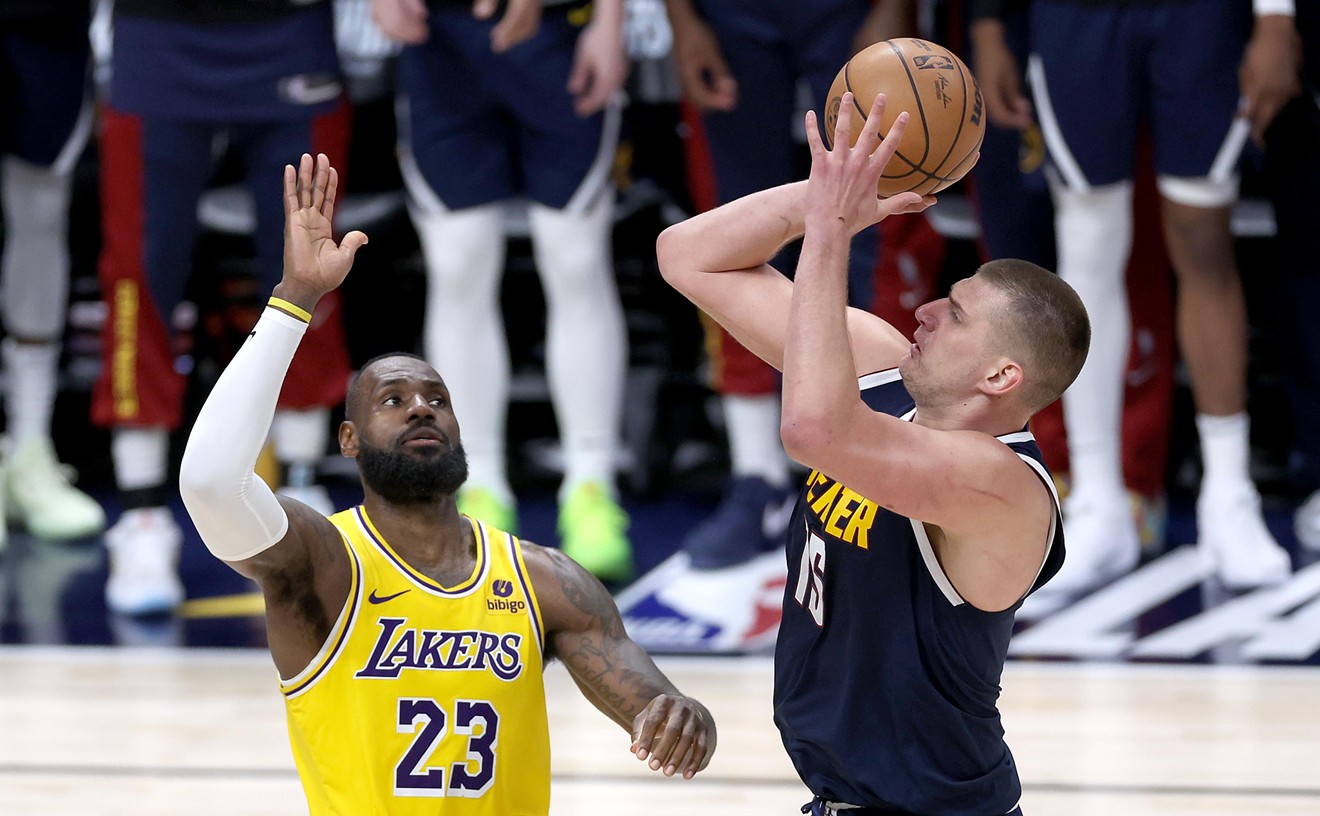All is not awful for the News and the Post, especially in terms of labor. In April, News editorial types ratified a new long-term contract, joining their brethren at the Post, who have inked a nearly identical pact. Since DNA business-siders are also under contract, these arrangements squelch the threat of strikes for years to come: Says Tony Mulligan, administrative officer for the Denver Newspaper Guild, "We're solid through 2008." In addition, a voluntary buyout offer made to over 300 workers in the production department last month is, to all appearances, running smoothly and hasn't triggered a notable public-relations hit.
Which can't be said in several other cases. Since the early-April debuts of the JOA-imposed weekend editions, DNA operators have been besieged by complaints about confusing TV listings, and many readers have also been baffled by production idiosyncrasies like varying page sizes and, in the May 13 Post, the splitting of the gargantuan comics section into two halves located in different parts of the paper. Likewise, the two-week absence of Monday-Thursday listings for Landmark Theatres venues such as the Mayan dismayed folks more into Memento than The Mummy Returns. Michael Williams, a Landmark spokesman, blamed the situation on ad-rate hikes that the chain was unwilling to pay given its current financial situation: Landmark's parent company, Silver Cinemas International, is bankrupt. (Oaktree Capital, described by Variety as a "vulture fund" that frequently partners with Denver moneybags Phil Anschutz, purchased Silver Cinemas at auction late last month; the deal is expected to close shortly.) Landmark eventually returned to its place in the so-called "Movie Timeclock," but only after a monetary compromise was reached.
The DNA doesn't like to talk about such arrangements, which can't help but recall the recent newspaper-war days when rate cards were widely ignored. Although agency spokesman Jim Nolan concedes that some new ad packages have been created to entice reluctant buyers, including a Monday-Thursday "introductory program" aimed at small businesses, he specifically denies rumors that rates have quietly been cut in the wake of widespread advertiser defections. Yet bargaining is taking place, and on a greater scale than has been acknowledged thus far. Mattress Factory, a major bedding firm that dropped out of the dailies when rates skyrocketed, returned to the Post on May 10, and according to a reliable source, it did so after DNA sales reps substantially lowered the take-it-or-leave-it price tag they presented mere weeks before. (Mattress Factory representatives declined comment.)
Nevertheless, ad totals in the average News and Post are down noticeably, and the words in some of those that remain carry a sting: One Tattered Cover notice sported the lines, "Due to increased advertising rates, we can no longer include all current events in this weekly ad."
That's not to mention updated circulation figures released by the Audit Bureau of Circulations on April 30, in which the Post's daily average dove by 11.9 percent and the News's fell off by 17.9 percent. In some ways, these dropoffs help. The DNA saves money when people cancel subscriptions bought at penny-a-day rates, and it does the same when a slimmed-down paper generates the same ad revenue as a fatter one did; the result is more profit per page. That's the tune the DNA's Nolan is singing, anyhow. "We're still transitioning to a new business model, one that moves from volume selling to value selling, and things are going pretty much as we anticipated," he says. "We're seeing a lot of the old free and heavily discounted advertising wash from the system, and that helps us in the long run."
Still, those advertisers need to go somewhere, and they're finding plenty of media outlets willing to welcome them aboard, including the Denver Daily News, a Monday-Friday newspaper whose first edition hit the streets last week. The Daily News's initial circulation was 1,000, with distribution focused on the downtown area, and while publisher-editor Mike Kirschbaum expects the numbers to grow by 1,000 copies per week, making that happen will be difficult given the paper's modest, eight-page size and dearth of original articles (the May 11 issue was dominated by copy ripped from the Associated Press wire). But Kirschbaum is optimistic and says the situation at the dailies hasn't hurt his cause. "We didn't time our launch to the JOA," he says. "But the JOA environment makes things a little more relaxing for us."
Russ Littler, president of The Employment News, sees the JOA as something more -- a golden opportunity. Littler's Denver-based company, which has branches in ten cities, produces weeklies specializing in job-oriented classified advertising, a longtime cash cow for daily newspapers that's trending downward nationwide due to increased competition from the Internet and other venues. (For example, recruitment advertising in the mighty Washington Post dipped a stunning 30 percent during 2001's first quarter.) Over the years, Littler has occasionally run radio ads in Denver touting The Employment News, but in the wake of the April jump in DNA rates, he authorized his company's largest local campaign to date -- a blitz of radio and (for the first time ever) television spots declaring that an ad in The Employment News costing a few hundred dollars would go for several thousand bucks in the Sunday Post. This approach has been effective, Littler believes; he's seen significant declines in other markets because of the soft economy, but his cash flow in Denver is holding steady.
Representatives at Denver radio and television mainstays are doing better than that, if not enormously so. Roger Ogden, president and general manager at Channel 9, says, "There's been a little upside, but not a windfall"; Graham Satherlie, general sales manager for Channel 7, says, "A lot of very interesting people who shall remain nameless are talking to us about what they want to do in the future"; and Lee Larsen, vice president and general manager for Clear Channel, says, "We've had a noticeable increase." Along with Channel 4's Rockford, these three confirm that their reps are actively pitching potential clients about the power of broadcast advertising, and a reasonable percentage of local businesspeople who've done all or most of their selling through the newspapers seem receptive to the idea of trying new things.
Of course, DNA account executives are doing likewise, even going so far as to target advertisers in this very publication, which has seen its page count climb steadily since April. A letter attacking Westword via the line "LET'S COMPARE PURE VOLUME" promises that qualifying signees "will receive an extra 20 percent off per ad with the 12-week commitment or an extra 40 percent off per ad with the 26-week commitment."
Monty Hall would feel right at home.
The name game: Last week in this space, consumer advocate and self-declared "troubleshooter" Tom Martino announced plans to file a lawsuit against Scott McDonald, the former managing editor at Channel 31, where Martino also works, for allegedly defrauding him of $50,000 -- and he said he'd finger Channel 31 in the document as well. Thus far, however, he hasn't followed through. Jody Reuler, Martino's lawyer, says Martino had to leave town late last week to care for his ailing mother, thus delaying the suit's filing by approximately two weeks. But Reuler insists that Martino has no intention of dropping the matter and will likely bring it before the courts upon his return.
Meanwhile, the McDonald affair received major play by numerous Denver media outlets, Channel 31 included. The most devoted scribe was Penny Parker, gossip columnist for the Rocky Mountain News, who wrote about it on four separate occasions and induced a pair of local celebrities not previously linked to McDonald -- Barry Fey! Ed Greene! -- to reveal that he'd approached them with investment schemes as well. Pretty soon people will be pretending that they were scammed for fear of seeming too unimportant for McDonald to shake down.
That's not the way it was prior to the day the story broke. Indeed, three sources who spoke to yours truly only after receiving a promise not to use their names insist that Denver Post staffer Joanne Ostrow made a similar pledge but then printed their monikers anyhow. Ostrow refutes this charge: She says she received approval from each person with whom she spoke before printing their names in her May 9 article on McDonald. But she confirms that she never called Channel 31 personalities David Treadwell and Will Jones before writing that they were owed money. Ostrow says, "I got their names from McDonald" -- a man under investigation by the Denver District Attorney's Office -- and gave neither a chance to respond.
According to Ostrow, Post rules state that articles can't use anonymous sources, but that's an oversimplification. Post editor Glenn Guzzo maintains that there can be exceptions to the policy, but he acknowledges a "predisposition" toward the presence of names. This tendency cuts both ways: Some readers believe that unnamed sources damage a piece's credibility, while others understand that certain stories might not otherwise reach the public. But there's no doubt that sources who've been burned are less likely to take a journalist's word in the future, and that only adds to the perception that reporters are two-faced scumbags who can't be trusted.
Back to McDonald: One source who still wants to remain anonymous (despite being named in the Post) received $500 from McDonald last week, or just over 5 percent of the amount owed. Payback is a bitch.
The dinner party: How close did Steve Kelley come last week to quitting his job at Colorado Morning News, KOA's morning-drive staple? That depends on whom you ask. Kelley didn't return calls from Westword, nor did April Zesbaugh, his CMN co-host, but KOA program director Don Martin allows that tensions were running high. As he puts it, "Steve Kelley had a bad day."
The brouhaha began after CMN scored big in the latest ratings book: Martin says the program was number one among listeners ages twelve and above, and a shade off the top spot in the key 25-54 demographic. To celebrate, plans were made to treat the show's staff to a May 12 dinner at swanky Brook's Steak House -- but somewhere along the line, word got out that spouses and significant others could not attend. (Although several insiders say guests were invited, then uninvited, Martin denies it.) Upset, Kelley stormed into Martin's office on May 10 and, after the two exchanged heated words, stormed out again. When Kelley played hooky from the next day's broadcast, rumors circulated that he'd resigned -- but he was back behind the microphone on May 14.
What happened? The aforementioned insiders say feathers were smoothed after a meeting between KOA honchos and Kelley's lawyers, but Martin won't go there. The way he tells it, "Steve was upset about some things and walked out. But after that, he was allowed to say his piece, I was allowed to say mine, and cooler heads prevailed -- and his butt's back on the radio again."
Oh, yeah: Kelley dined at Brook's on May 12. Sans one wife.











